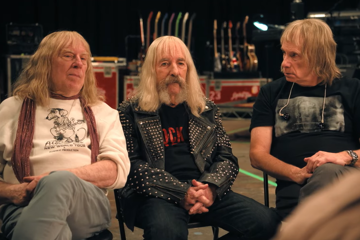Film Carew: Lucy, A Most Wanted Man
Scar-Jo kicks ass and blows minds while Philip Seymour-Hoffman gives an eerie swansong
LUCY

We’re living in the Golden Age of Scarlett Johansson. She’s already headlined what’re shaping as 2014’s two best films, Spike Jonze’s Her and Jonathan Glazer’s Under The Skin, and here she comes now, all-conquering and all-encompassing in the popcorn thriller Lucy, a swaggering action-hero bad-ass, the still point at the centre of a whirlwind cinematic world seemingly erected in shrine to her. Where Scar-Jo was once worshipped for her hotness, now she deserves commendation for her curatorial career approach; for spending her precious few hours free from Marvel’s oligarchal contractual obligations by pursuing thespian liberation.

There’s a throughline in each role, too: Johansson playing a simple entity —user-pay operating-system; dispassionate alien-on-a-mission; clubbing babe with bad taste in men— who undergoes a revolutionary, evolutionary journey; going beyond her ken, and over symbolic frontiers, in search of once-unknowable knowledge. The analogy for her career barely needs pointing out.
Don't miss a beat with our FREE daily newsletter
Surprisingly, Lucy actually shares a sense of ambition with Her and Under The Skin. It’s a wildly visual film about the biggest of themes, a conversation on evolution and existentialism barely contained by its singular cinematic world. Of course, this world is rendered by Luc Besson, the French franchise-builder who never met a high-concept he couldn’t colour in with colourful comic caricatures, couldn’t punch up with fistfights, couldn’t illuminate with explosions.

In one memorable Lucy moment, there’s a shootout between French cops and Korean gangsters in a university library, all the strafing bullets and spraying plaster and crumbling busts obvious symbols of humanity’s bad apples destroying the enlightened pursuit of knowledge. Not content with mere automatic weaponfire, Besson ups the ante, and —in the close confines of a library hallway!— has one of his goons bring a rocket-launcher to a gunfight. The analogy for his career barely needs pointing out.
That career has, amidst its fondness for the over-the-top, recurringly returned to the figure of the female action-heroine: from La Femme Nikita a quarter-century ago; to an ill-advised Joan Of Arc-as-proto-feminist-pin-up hook-up with then-wife Milla Jovovich, The Messenger, at the turn of the century; to a recent ridiculous romp with Louise Bourgoin, The Extraordinary Adventures Of Adèle Blanc-Sec. Besson’s latest über-babe is introduced in the iconic singular, Lucy a wandering American party girl studying and clubbing in Taiwan. Within minutes, she’s handcuffed to a suitcase that must be taken to the terrifying Choi Min-sik. The appearance of the Oldboy icon shows the clear affinity between Besson and this generation of Korean action auteurs; he, too, a filmmaker fond of precise styling, unexpected comedy, and a bit of the old ultraviolence.

Johansson is roped into service as a mule, a package of a synthesised super-drug sewn into her abdominal cavity. When the bright-blue baggie bursts inside, the serum starts leaking into her system, giving Lucy the mystical powers of a super-human savant (with anyone even remotely beholden to scientific plausibility in cinema likely to turn into Neil deGrasse Tyson-watching-Gravity at the run of preposterousness). She’s got 24 hours to live, complete command of time-and-space, a revenge-mission tracking down Choi and his minions, and, ultimately, bigger fish to fry. She seeks to know everything, to understand the impulse of creation and the meaning of each infinitesimal molecule, making her a super-human whose impulse is still human. She may be a dispassionate killing machine who no longer feels pain, but when she calls back home to tell her mother she loves her —and marvels at her newfound ability to remember every single instance of her life in exacting detail— we feel her pain, nostalgia’s ache from an old wound.
“Life was given to us a billion years ago, what’ve we done with?” Scar-Jo intones, in an opening voice-over gambit that sets its race-against-the-clock, shoot-’em-up premise against the entire evolutionary history of the universe. Lucy is peppered by rapid-edited bursts of illustrative imagery, stock footage of wildlife, natural disaster, human ingenuity and the galaxy cut up into hyper-speed, video-clip visuals for the short-attention-span generation. Eventually, our heroine takes a tour through all space-and-time in an ergonomic desk-chair, controls the information of the world’s innumerable molecules by smartphone-swiping matter at her whim, and, as Johansson did in Her, evolves beyond all understandable worldly limits.
In Spike Jonze’s high-waisted, hipster-moustached world, that evolution symbolised the woman who outgrows your relationship. Here, in Besson’s career crater of exorbitant excess, it symbolises humanity’s desire for more: more knowledge, more brainpower, more handheld computer devices, more explosions, more action-thrillers built around specious pseudo-science. Lucy is hardly unique in this: it was only months ago that we suffered through the 1-star tedium of Transcendence. That film’s answer to depicting all-powerful hyper-sentience was a comatose, cheque-cashing Johnny Depp, continuing to sleepwalk through the inertia that is his filmography. Lucy, however, gives us Scar-Jo, radiant with life, a luminous light whose career is in full flight. If 2013 marked the McConaissance, 2014 has seen the Johansscendance.
A MOST WANTED MAN

Anton Corbijn’s A Most Wanted Man marks the final leading role for actor-of-our-generation Philip Seymour Hoffman, our last chance to see him headlining a new movie. But even those going to cinemas with the most respectful, noble of ambitions may start to feel like rubberneckers at a car-accident, or vultures circling a staggering beast dehydrating in the desert. The Hoffman on screen in A Most Wanted Man isn’t dead yet, but there’s an uncanny feeling watching him play a self-destructive dick, who drinks and smokes and punches lowlifes in dive bars because he’s for-sure his life isn’t going to be a long one.

Hoffman’s character has walked off the pages of John le Carré, which is to say he’s a career-spy, the conflicted man of an artful airport-novel, philosophical about his cases and forever kicking against the pricks of espionage’s overseers upstairs. He’s also a German living in Hamburg, which means those viewers concerned with cinematic vérité need be warned that Hoffman, Rachel McAdams, and Willem Dafoe all play locals speaking English in wavering Deutsche accents. Hoffman’s tailing a Chechen refugee (Grigoriy Dobrygin) suspected of harbouring terrorist connections; McAdams the kid’s in-over-her-head, blonde-babe-on-a-bike lawyer; Dafoe a banker blackmailed into taking part in a sting. They’re all ‘pretty good despite the weird accent/language thing’, which is the exact same thing you can say about the film itself.

After his tightly-framed, tautly-controlled work on another spy-movie, 2010’s The American, Corbijn’s direction tends towards something much blander here; a hard task to accomplish given the great Benoît Delhomme is the DOP. The goal seems to be to turn Hamburg into a character in the film, but instead it takes on the look of a bland every-city; its shipping-container-stacked docks, Chinatown dives, glittering downtown financial district, and steely tungsten street-lights the visual signifiers of innumerable 21st-century cities. Being the 21st-century, A Most Wanted Man swirls post-9/11 tension, high-finance trading, and gentrification into its cosmopolitan, multicultural milieu.
Through this landscape wanders Hoffman, a walking ghost, a man scarred by the past and half checked-out on the future. His fatalism is an attempt to safe-guard him against disappointments, but still they inevitably come. Le Carré, as ever, is out to chronicle spying as any other workplace: one in which bureaucracy, politicking, and self-interest win out over the more noble notions of the work. It’s, sadly, a little too symbolic of Hoffman’s own work, both within the film and across his career: the actor suffering on behalf of an industry that shares precious little of his virtuous zeal.







